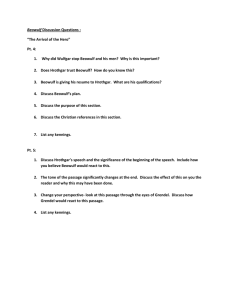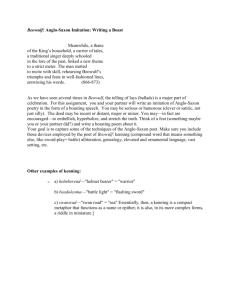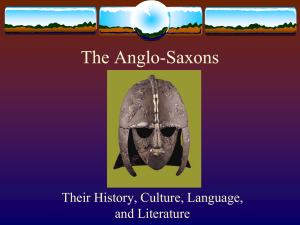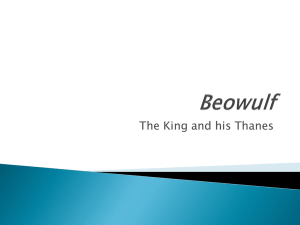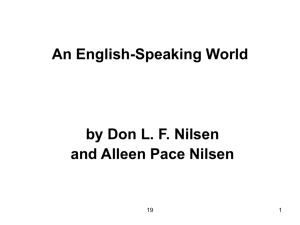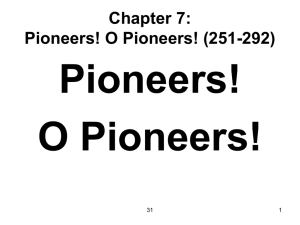Beowulf - MKersey KHS Courses
advertisement
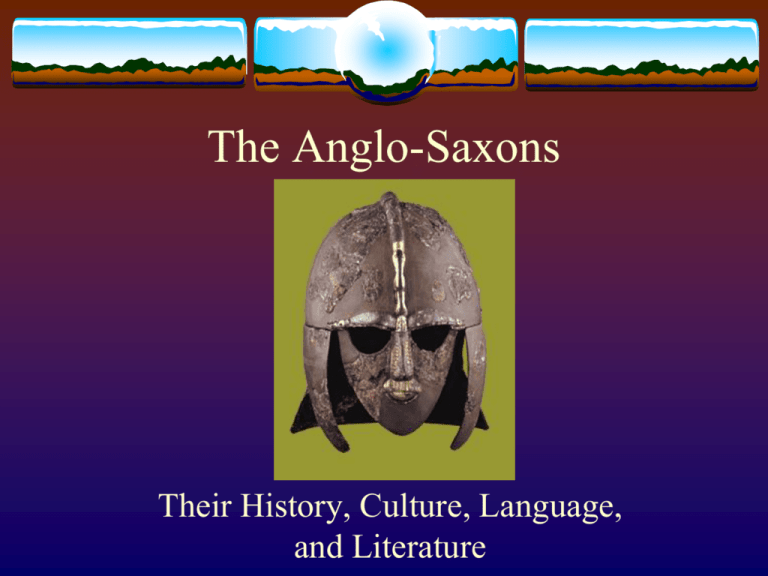
The Anglo-Saxons Their History, Culture, Language, and Literature Ancient Britain 2000 - 43 A.D. Inhabited by Britons and Celtic people Farmers and hunters Society organized into clans Ruled by tribal chieftains elected from the class of pagan priests Priests known as the Druids Roman Britain 43 – 449 A.D. 43 A.D. – Romans, under Claudius’s rule, conquer Britain. Brought their law, culture, comforts, and Latin language to the land. The Celts become “Romanized,” tribal disputes stop, and things are fairly peaceful. Britons were converted to Christianity with the rest of the Roman Empire in the 4th century. 5th century(410 AD) – Roman occupation ends. Arrival of the Anglo – Saxons 5th Century A.D. Withdrawal of the Romans left the native Britons vulnerable. Next 100 years – Britons were invaded by seafaring, Germanic invaders. Three tribes known as Angles, Saxons, and Jutes (were originally hired by Celts and Britons as mercenaries to drive out the Romans). Invasion forced natives to retreat to Wales. Old English Period begins in 449. Source: http://www.bbc.co.uk/schools/anglosaxons/invasion/index.shtml Anglo-Saxon Culture A.S. brought legends about ancient German heroes and kings. Warriors were celebrated in lays or songs sung at feasts by a gleeman or scop. Lays accompanied by the harp or lyre. Songs composed orally – for entertainment, but also kept history alive. Kings would entertain friends in mead halls, named for the drink mead made from fermented honey. Heorot – The Meadhall in Beowulf Anglo-Saxon Themes and kingship – the relationship between kings and their thanes (warriors). Wergild- “man price” or retribution for the death of one’s family member. Heroism After the arrival of Christianity, their relationship with God takes on these themes. Themes cont’d. Wyrd- Exile- “Fate” controlled one’s destiny. the cost of being abandoned or apart from one’s tribe and society. Anglo-Saxon Religious Beliefs (Before Christianity) A.S. were Pagans. Christianity of Roman times kept alive only in remote regions. Every human life in the hands of fate (Old English: wyrd). Worshipped ancient Germanic gods: Tiu, god of war and the sky; Woden, chief of the gods; and Fria, Woden’s wife. Tuesday, Wednesday, and Friday Anglo-Saxon Society Organized into a class of warriors known as earls or thanes. These warriors protected and were devoted to the king, who was chosen by a witancouncil of elders. There was also a class of freemen known as churls. Slaves were known as thralls. Women, as “peace-weavers” King Witan (chose king) Thanes (nobles) Churls (freemen) Thralls (slaves) **Women known as peaceweavers. Weapons of War A Typical Village Return of Christianity All of England converted to Christianity upon the arrival of Augustine in 597 A.D. Augustine began by converting King Ethelbert of Kent. Rest of England soon followed. Monasteries built. By 731 A.D.-Christianity well-rooted The Scribes In monasteries, scribes produced books by hand. Books were usually religious in nature. Focused on saints’ lives and sermons. There were also copies of the oral literature. Because of these Christian scribes, Anglo-Saxon culture was recorded. “Father of English History” – the Venerable Bede, a Northumbrian monk. The Danish Invasion 8th century (700s AD) Vikings (warriors) carried their piracy to the British Isles, bringing destruction and fear. Despite England’s efforts to defend itself, most of northern, eastern, and southern England fell to the Danes by the middle of the ninth century. Only the Saxon kingdom of Wessex fought the Danes to a standstill. Norman Invasion 1066 AD Normans Invade King Edward had promised the throne to his French cousin William I (William the Conqueror), but when he died, the throne was given to Harold. Battle of Hastings: William I invaded and killed Harold. Bayeux Tapestry (depiction of events) Bede and “Caedmon’s Hymn” Bede Monk/Historian Composed “Caedmon’s Hymn” around 658-680 AD One of the oldest manuscripts Written in Old English Christian themes Old English: Caedmon’s Hymn Verse Early Saxon Nu sculon herigean heofonrices weard, meotodes meahte and his modgeþanc, weorc wuldorfæder, swa he wundra gehwæs, ece drihten, or onstealde. He ærest sceop eorðan bearnum heofon to hrofe, halig scyppend; þa middangeard moncynnes weard, ece drihten, æfter teode firum foldan, frea ælmihtig. Now [we] must honour the guardian of heaven, the might of the architect, and his purpose, the work of the father of glory — as he, the eternal lord, established the beginning of wonders. He, the holy creator, first created heaven as a roof for the children of men. Then the guardian of mankind the eternal lord, the lord almighty afterwards appointed the middle earth, the lands, for men. English Words Our 100 most common words use in Modern English today are derived from Old English. Our basic sentence building words such as the, is, and you are derived from Old English (McCrum 45). Riddles Not only did the English enjoy the stories told to them by the scops, but they also enjoyed “innuendoes and word-play” (McCrum 47). One of the most famous Old English word-play books is The Exeter Book of Riddles (McCrum 47). Try to figure the riddle on the next slide. Riddle #69 from The Exeter Book of Riddles “On the way a miracle: water becomes bone.” The answer is ice. Epic Hero a great leader who identifies with certain people Setting broad and includes upper/lower worlds Hero does great deeds in battle and/or undertakes an extraordinary quest Supernatural elements occur when gods or other beings take part in the action and hero possesses supernatural strength Story told in heightened language (poem) Beowulf Unknown author Set in 500s AD (known because of one datable fact in poem—a raid that occurred in 520 AD) Composed around 8-10th centuries and passed down orally Written down possibly in 10th century Original manuscript destroyed in fire in 1731, causing loss of sections Mostly Christian themes, but some Pagan—question over whether composer was Christian or whether ideas were later added People and Places in Beowulf Beowulf: a Geat, son of Edgetho and nephew of Higlac, king of the Geats. Higlac is both Beowulf’s feudal lord and his uncle. Grendel: man-eating monster who lives at the bottom of a foul mere, or mountain lake. His name might be related to the Old Norse grindill, meaning “storm,” or grenja, “to bellow.” Herot: golden guest hall built by King Hrothgar, the Danish ruler. Hrothgar: king of the Danes, builder of Herot. He had once befriended Beowulf’s father. Hrothgar’s name might mean “glory spear” or “spear of triumph.” Grendel’s Mom: lives at the bottom of the lake with her son Unferth: one of Hrothgar’s courtiers, reputed to be a skilled warrior. His sword, called Hrunting, is used by Beowulf in a later battle. Welthow: Hrothgar’s wife, queen of the Danes. Wiglaf: a Geat warrior, one of Beowulf’s select band, and the only one to help him in his final fight with the dragon. Wiglaf might be related to Beowulf. Beowulf’s final nemesis, angry over a stolen cup Dragon:


